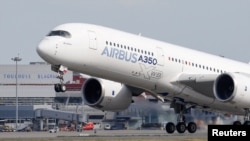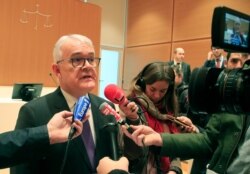In the largest settlement of its kind, European aircraft maker Airbus SE has agreed to pay nearly $4 billion to resolve foreign bribery and other charges with authorities in the United States, Britain and France, the Justice Department announced Friday.
In an agreement with U.S. prosecutors, Paris-based Airbus, the world's second-largest manufacturer of civilian and military aircraft, admitted using intermediaries over several years to bribe government officials and airline executives in order to win lucrative contracts in China and other countries.
Airbus entered into a so-called deferred prosecution agreement with the Justice Department three days after federal prosecutors accused the company of violating the Foreign Corrupt Practices Act (FCPA) and conspiracy to violate the Arms Export Control Act (AECA) and its implementation regulations. Under the deferred agreement, prosecutors agree to hold off on proceeding with a case against a company in exchange for meeting certain conditions.
The foreign bribery charges against Airbus stemmed from its offer and payment of bribes to foreign officials, including Chinese government officials, according to the prosecution agreement. Involved in the China bribery scheme were at least seven unidentified Airbus executives — including two Chinese officials and three entities responsible for making aircraft purchasing decisions for the Chinese government.
Between 2013 and 2015, Airbus executives made payments to a business partner in China that were intended to be used as bribes to Chinese officials, according to prosecutors. The bribes were paid in order to win contracts for the sale of Airbus aircraft to Chinese government airlines.
The AECA charges resulted from Airbus' failure to disclose to U.S. authorities political contributions, fees and commissions made in connection with the sale and export of military goods and services to a foreign military.
"Airbus engaged in a multi-year and massive scheme to corruptly enhance its business interests by paying bribes in China and other countries and concealing those bribes," said Assistant Attorney General Brian A. Benczkowski of the Justice Department's Criminal Division. "The Department will continue to work aggressively with our partners across the globe to root out corruption, particularly corruption that harms American interests."
As part of the settlement, Airbus will pay nearly $600 million to U.S. authorities, $2.29 billion to authorities in France, and more than $1 billion to Britain's Serious Fraud Office. The settlement with British authorities involves allegations of bribes paid in Malaysia, Sri Lanka, Taiwan, Indonesia and Ghana.
Foreign Corrupt Practices Act
Enacted in 1978, the FCPA bars corporations and their executives from bribing foreign government officials to gain a business advantage. Over the past decade, the Justice Department has stepped up enforcement of the law, using its broad jurisdiction to target foreign executives and companies involved in bribing officials in other countries. Enforcement has remained robust under the administration of U.S. President Donald Trump despite his past criticism of the law as unfair to American companies.
Historically, China has made up a disproportionately large number of FCPA cases involving foreign executives bribing Chinese officials. A 2018 Justice Department initiative aimed at countering Chinese national security threats to the U.S. prioritizes FCPA cases involving Chinese companies that compete with American businesses.
"International corruption involving sensitive U.S. defense technology presents a particularly dangerous combination," said David Burns, a senior official in the Justice Department's national security division.
The Justice Department encourages companies to self-report violations of foreign bribery and export control laws in exchange for leniency. Although Airbus disclosed the FCPA violations to the Justice Department only after they came to light in Britain several years ago, the company received credit for its cooperation with the ensuing investigation.





